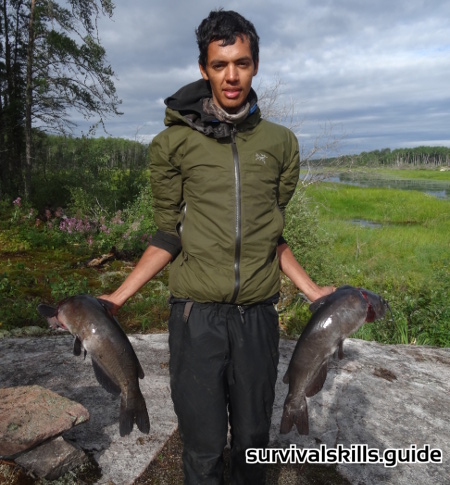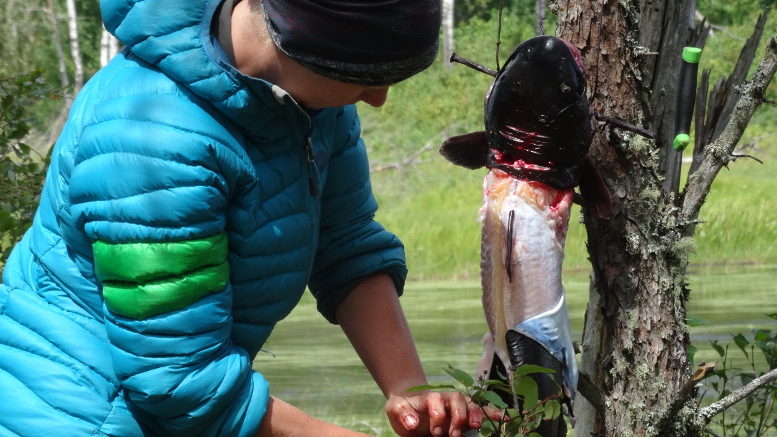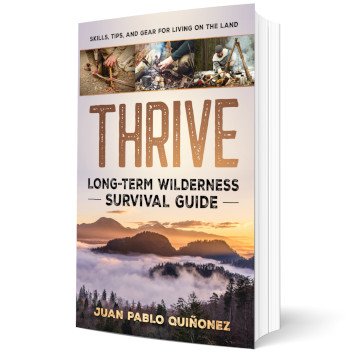The other day I dreamed of a catfish being hooked in one of our lines during the 180 days I lived in the boreal forest. One of the reasons why I don’t like living in civilization and eating food from the supermarket is that it is extremely easy to forget where food is coming from. As I learn more about hunter gatherer perspectives, I understand better the sacred bond between hunters and prey, between foragers and wild edibles.
When my partner and I lived in the boreal we ate a ton of catfish, it was our most important food. We began to feel immense gratitude, and even a sense of duty towards them. We used leeches as bait, we baited our hooks, we killed the catfish, filleted them, cooked them, and ate them. We were part of the entire process. Eating is one of the most important ways in which we are part of nature, just like breathing and drinking. We didn’t just fish for a weekend to complement our meals. Fish was our livelihood day after day. When we didn’t catch fish, we really felt it. We had the opportunity of experiencing chronic hunger, and learned the value of food the only way that one can truly understand it, by being semi starved. We were at the mercy of fish.
Experiencing that connection fully, without intermediaries was one of the main gifts of our quest. By being so dependent and connected to the catfish, I began to understand how it is that hunter gatherers had to have a sustainable culture. By being in a close relationship to their foods for thousands of years they had to cooperate; their relationships had to be mutually beneficial, or else, one, the other, or both would perish. They had to live in place, and get their foods in a sustainable way.

Another way in which the obvious realization that we all live off the land struck me is that we owe it to the land, plants, and animals that give their lives daily for us, to do something good and return the favor. I wish more people developed a strong sense of dependence to a healthy Earth. I wish more people could set off to the forest, drink unfiltered water, catch and collect wild food for weeks and months, and experience what life outside the bubble of civilization is like.
A reason why I don’t like vegetarianism and veganism (although I get where it’s coming from) is that it constricts the relationships you can form with the animals around you. When you don’t depend on the salmon from the nearby river to eat, it’s not as hard to see their numbers dwell year after year. I’m sure there are many vegans out there grieving and campaigning for salmon. But I assure you that if their lives truly depended on salmon, without other alternatives, they would be doing much more.
One of our greatest tragedies is that as our civilization depletes a source of food in a particular place it can either target a different species, or change a location (in the short term). Hunter gatherers couldn’t do that. They returned yearly to their favorite hunting and foraging grounds.
The unfortunate part is that both industrial agriculture, and industrial farming are incredibly unhealthy, unsustainable and toxic ways of relating to the land. As living things living off the land, we have a duty towards the land and the living things that we consume. It’s an unwritten natural law, that sustainable cultures lived and live by. This law sooner or later will manifest itself in full (salinization for instance).
On of the big ways in which large scale agriculture is inherently destructive is how it monopolizes the land for human use. Destroying the habitat, and displacing or killing the living things that belonged there. There’s no easy way out…
What do I suggest? Trying as much as possible to be connected to the land in a sustainable way. And remembering that every second of your life has been made possible by millions of living things living and dying. No matter what you eat, your life depends on the death of living things. What you can strive to do is make the process mutually beneficial for yourself, the species you eat, and the Earth. Eating locally sourced foods, from small scale, labor intensive farming as well as from wild sources is a good way to start. Organizing and returning the favor is another way. I know it’s easier said than done…. so we better get at it.


